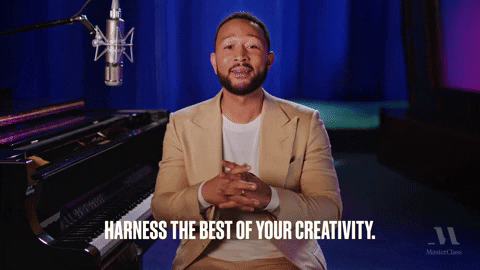The buzz around AI in marketing is fueled by its ‘transformative potential in revolutionizing traditional marketing strategies’. Things are changing. But...
Haven’t they always been?
Marketing as we know it today is not the same as five years ago. It’s barely the same as last year or even a few months ago. Remember the frenzy around the death of third-party cookies, anyone?
And yet, the marketing world continued on as we embraced and learned new things — we adapted.
So, what’s different this time?
What is all the fuss about AI, and will it take our jobs?
Short answer: no.
Long answer:
Still no, because the buzz around AI in marketing is fueled by how it’ll change how we do things, and that always feels scary (especially if you’ve been reading and watching a lot of books and films of robot uprising).

We must remember that, at the end of the day, AI is just another tool with more intelligence than your average robot vacuum cleaner — it’s the person who’s learned how to leverage AI’s intelligence that you need to worry about.
As Richard Baldwin, Professor of International Economics at the Graduate Institute of International and Development Studies in Geneva, puts it beautifully:
AI won’t take your job – it’s someone using AI who will.
Richard Baldwin
(And psst: If you're interested in this topic, stay tuned for more and subscribe to our Advance Insider newsletter to make sure you won't miss any future posts!)
Okay, but seriously, what will change with companies using AI?
Short answer: Many things.
Long answer: AI is going to change the way marketing teams drive marketing efforts. From creating content to data collection, market research, customer engagement, search engine optimization, etc.
So, what can you do about it?
Plenty. Oh, so plenty. Plentiful.

But, to cut through the noise, we can already tell you that the gist of everything is:
Your creativity and strategic thinking will be your strongest assets. Ever. Regardless of changes and new AI systems or technology that will come your way.
Nonetheless, here are five things to start with 👇
1. Invest in strategic marketing because tactical marketing alone is not going to be enough
There was a time when content marketers would get really upset whenever they heard ‘everyone can write’.
Well, there is a certain truth to it nowadays because…thanks, AI. But more on that later.
Now, with AI, it also means that ‘everyone can do marketing’.

If you were in a room full of marketers, I can guarantee that you’ll hear groans and murmurs that sound as though everyone’s been tasked with removing that day-old red wine stain on a white carpet in five minutes or they’ll be locked in that room forever.
Here’s why. Access to AI means two things:
- More noise in the industry and the market makes it difficult to know what’s true and what’s not.
- More players claiming to be experts and making marketing tactics cheaper than ever.
A combination of these two means there’s a constant battle of trying to sift through the noise, which leads to losing sight of your long-term strategy — and there’s a huuuuuuuge difference between strategic marketing and tactical marketing.
That leads us to the next point:
2. Use the power of AI to let your authenticity shine, and not blend in.
There are so many advantages of AI in marketing, and we can talk day and night about how great it is and how much time it saves so you can sleep at night ( sounds familiar?).
But there are also both sides to a coin.
While AI is a content farmer’s best friend, it's also a brand’s enemy.
There is already a lot of half-thought, no-value-adding, entirely untrue rubbish content pieces on the internet. It’s waaaay too much noise generating way too little trust these days because everyone sounds the same. 
This is where the depth and the authenticity of your voice come in. Ask yourself these questions:
Are you the thought leader whose opinion and knowledge everyone trusts?
Or
Are you another AI-generated thought leader who’s only as good until a better prompt comes along?
Use AI tools in your marketing operations, like market research or data analysis, to gain ideas you wouldn’t otherwise have thought of. But don’t let it take over your voice and your brand.
3. Hold your brand relevance as the highest priority because search engines will be different…again.
Strategic marketing stands out for its emphasis on long-term vision and goals that align marketing efforts with your business objectives.
That means building long-lasting customer relationships that contribute to strong brand-building in the market.
There’s no denying that immediate gains are great for reporting and campaign-specific objectives. But it doesn't lay the same foundation for responding to changing market conditions.
At the risk of sounding like the worst broken record or robot, the last three years have been quite the proof of how the market can turn topsy-turvy in a day.
Think about the businesses that are still around and the ones that have gone belly up. What do they have in common?

If I were to ask, ‘What are your Top 3 favorite newsletters to subscribe to?’, you’re very likely to be able to share that in a jiffy. And it’s probable that it’s because they have really good content you want to read.
Want to know what happens next?
You’ll see those names in my search history, and they will see my e-mail in the ‘New Subscribers’ list — this is the change that we’re looking at now.
No one really knows what the SEO game is going to look like in the near future. But we do know that organic search is now becoming less important.
It’s the endorsement by direct connections and communities of a trusted brand that we’ll seek.
4. Focus on high-quality content generation
“So does that mean I shouldn’t use AI?”
Short answer: no, it doesn’t mean that.
There is a saying that goes, ‘Two heads are better than one’.
In the past, it meant getting insights or ideas with the help of another person. Most likely, your co-worker. However, they may not always be available to do that or help you with your large-scale research.
This is where AI comes in handy.
More importantly, use AI to help you produce better content that will also help you drive the conversion rate you’re looking for.
If you think cutting through the fluff for trustworthy content is tough as a marketer, imagine how it feels when you’re the target audience.
As it is, targeting and tracking are hard enough with third-party cookies being obsolete.
Whether or not someone wants to continue engaging with your brand and willingly provide you with their data depends on the content they engage with from the first touchpoint.
Use AI to help you generate ideas. But if you start to sound like everyone else…we don’t have to keep repeating ourselves here.
5. Use technology to boost your growth
Technology fatigue is real.
If you’re feeling that twinge of resentment or annoyance at another mention of AI, that’s completely normal.
(Are you thinking: doesn’t anyone talk about anything else anymore? We know.)
But as a matter of fact, we can’t run from it.
The reason why all these fancy technologies even exist and are taking over our daily lives, to begin with, is that we clearly have a need for them.

Let’s talk about the age-old ‘sales and marketing silo’ as an example.
This silo has existed long enough for it to be part of many interview processes for decades. Despite numerous suggestions to break them, many companies still couldn’t.
As a result, this very same silo is causing a lot of stalling in growth because information doesn’t flow as it should, and people have had to manually spend more time fixing friction that could be automated — by technology.
Technology adoption is only exhausting when you’re not using it strategically.
A part of strategic thinking is understanding how to build great processes with a sustainable tech infrastructure that brings value.
AI is not going to take your job. The person using AI will.
As we’ve mentioned in our last piece on embracing first-party data, let’s take a moment to pause and ask:
Are things really changing, or are we returning to doing things the “old school” way but with new technology?
Believe it or not, with proper guidance from you, AI can do some pretty cool things.

But it is only as good as the prompt we feed it.
Now, onto the changes that have been happening. First, it was the updates of search engines. Then came the sunsetting of Google’s Universal Analytics, and along came AI.
From our standpoint, there will always be something to blame for the big changes that are happening in the marketing realm. But changes will happen because that’s the only thing that’s certain (cliche much, I know).
There are two options:
We keep responding to every change for short-term relief so we don’t feel like we’re falling behind everyone else.
Or
We invest in the thing that will withstand the changes of time — BRAND
To sum it up, at the end of the day, AI is just another tool that is smarter than your smart devices.
It’ll never replace your creative ability and strategic thinking. So you might as well leverage the intelligence of this little sidekick called AI to bring out the best of your brand.
Think of it this way:
Now we all have our own Jarvis from Iron Man.
The bigger question is, what are we going to use Jarvis for?




